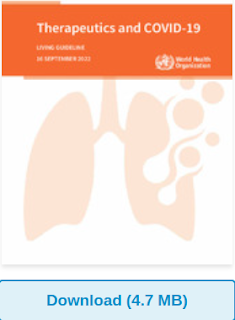While pundits and politicians debate whether the pandemic is `over', the WHO's most recent epidemiological report tells us that more than 3 million people were infected in the previous 7 days, and roughly 11 thousand people died from the virus.
For these people, and the millions yet to be infected this fall and winter, the real concern is what medications remain in our dwindling armamentarium against this pandemic virus.
While the cupboard is far from bare, over the the past year we've seen a serious erosion in the number of treatments still believed effective against the Omicron variants (see FDA Limits Use Of Sotrovimab Monoclonal Antibody As Rising BA.2 Erodes Effectiveness), and new evidence that casts doubts on many of the `accepted' treatments widely used in 2020-2021.
- Early hopes that convalescent plasma - harvested from those who had recovered from the illness - would be a game changer were quelled after study after study (see BMJ: Clinical Trial On Convalescent Plasma Showed Little Benefit For COVID-19) failed to show much effect.
- Earlier this year we also saw the FDA withdraw their EUAs on bamlanivimab and etesevimab (administered together) and REGEN-COV (casirivimab and imdevimab) (see FDA Removes Authorization For Two Monoclonal Antibody Therapies Due To Omicron).
While the details are of greatest interest to clinicians, the take-away for everyone else should be there are limited pharmacological options when it comes to treating COVID, which makes prevention of infection - via vaccination and/or NPIs - still very much worth doing.
Some highlights from the latest WHO COVID Therapeutics update follows:
Therapeutics and COVID-19: Living guideline, 16 September 2022
16 September 2022
| COVID-19: Clinical care
Download (4.7 MB)
Overview
The WHO Therapeutics and COVID-19: living guideline contains the Organization’s most up-to-date recommendations for the use of therapeutics in the treatment of COVID-19. The latest version of this living guideline is available in pdf format (via the ‘Download’ button) and via an online platform, and is updated regularly as new evidence emerges.
This twelfth version of the WHO living guideline now contains 19 recommendations. This latest update provides updated recommendations for remdesivir, addresses the use of combination therapy with corticosteroids, interleukin-6 (IL-6) receptor blockers and Janus kinase (JAK) inhibitors in patients with severe or critical COVID-19, and modifies previous recommendations for the neutralizing monoclonal antibodies sotrovimab and casirivimab-imdevimab in patients with non-severe COVID-19.
The WHO Therapeutics and COVID-19: living guideline currently includes a:
** UPDATED ** conditional recommendation for the use of remdesivir in patients with severe COVID-19, and a conditional recommendation against the use of remdesivir in patients with critical COVID-19 (first published 20 November 2020, updated 22 April 2022, updated 16 Sept 2022);
** UPDATED ** strong recommendation against the use of sotrovimab in patients with non-severe COVID-19 (first published 14 January 2022, updated 16 Sept 2022); Note: this update replaces the previous conditional recommendation for use of this drug.
** UPDATED ** strong recommendation against the use of casirivimab-imdevimab in patients with COVID-19 (first published 24 September 2021, updated 03 March 2022, updated 16 Sept 2022); Note: this update replaces the previous conditional recommendation for use of this drug.
** NEW ** recommendation concerning the concomitant use of IL-6 receptor blockers (tocilizumab or sarliumab), and the JAK inhibitor baricitinib: these drugs may now be combined, in addition to corticosteroids in patients with severe or critical COVID-19 (published 16 Sept 2022);
recommendation not to use fluvoxamine in patients with non-severe COVID-19 except in the context of a clinical trial (published 14 July 2022);
strong recommendation against the use of colchicine in patients with non-severe COVID-19 (published 14 July 2022);
strong recommendation for the use of nirmatrelvir-ritonavir in patients with non-severe illness at the highest risk of hospitalization (published 22 April 2022);
conditional recommendation against the use of nirmatrelvir-ritonavir in patients with non-severe illness at a low risk of hospitalization (published 22 April 2022);
conditional recommendation for the use of molnupiravir in patients with non-severe COVID-19, at highest risk of hospitalization (excluding pregnant or breastfeeding women, and children) (published 03 March 2022);
strong recommendation for the use of baricitinib as an alternative to interleukin-6 (IL-6) receptor blockers, in combination with corticosteroids and IL-6 receptor blockers (tocilizumab and sarilumab), in patients with severe or critical COVID-19 (published 14 January 2022, updated 16 Sept 2022);
conditional recommendation against the use of ruxolitinib and tofacitinib in patients with severe or critical COVID-19 (published 14 January 2022);
strong recommendation against the use of convalescent plasma in patients with non-severe COVID-19 (published 7 December 2021);
recommendation not to use convalescent plasma in patients with severe or critical COVID-19 except in the context of a clinical trial (published 7 December 2021);
• strong recommendation to use IL-6 receptor blockers (tocilizumab or sarilumab) in patients with severe or critical COVID-19 (published 6 July 2021);
• recommendation not to use ivermectin in patients with COVID-19 except in the context of a clinical trial (published 31 March 2021);
• strong recommendation against the use of hydroxychloroquine in patients with COVID-19 of any severity (published 17 December 2020);
• strong recommendation against the use of lopinavir/ritonavir in patients with COVID-19 of any severity (published 17 December 2020);
• strong recommendation to use systemic corticosteroids in patients with severe and critical COVID-19 (published 2 September 2020);
• conditional recommendation against the use of systemic corticosteroids in patients with non-severe COVID-19 (published 2 September 2020).
Other COVID-19 therapeutics that are currently under consideration by WHO include anticoagulants. This guideline will be updated if/when sufficient new evidence warrants this.
